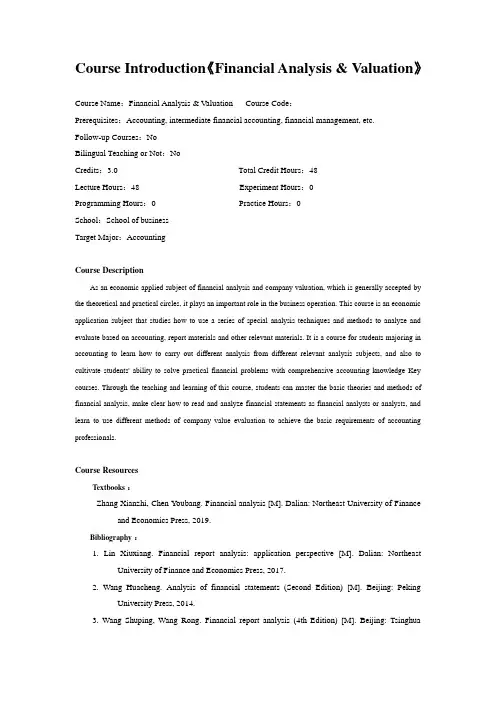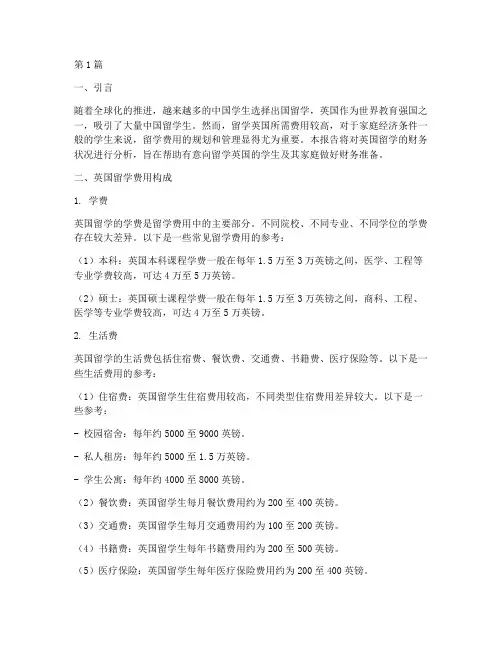英国名校布里斯托大学财务分析和证券估值课程5
- 格式:ppt
- 大小:279.00 KB
- 文档页数:22



Course Introduction《Financial Analysis & Valuation》Course Name:Financial Analysis & Valuation Course Code:Prerequisites:Accounting, intermediate financial accounting, financial management, etc.Follow-up Courses:NoBilingual Teaching or Not:NoCredits:3.0 Total Credit Hours:48Lecture Hours:48 Experiment Hours:0Programming Hours:0 Practice Hours:0School:School of businessTarget Major:AccountingCourse DescriptionAs an economic applied subject of financial analysis and company valuation, which is generally accepted by the theoretical and practical circles, it plays an important role in the business operation. This course is an economic application subject that studies how to use a series of special analysis techniques and methods to analyze and evaluate based on accounting, report materials and other relevant materials. It is a course for students majoring in accounting to learn how to carry out different analysis from different relevant analysis subjects, and also to cultivate students' ability to solve practical financial problems with comprehensive accounting knowledge Key courses. Through the teaching and learning of this course, students can master the basic theories and methods of financial analysis, make clear how to read and analyze financial statements as financial analysts or analysts, and learn to use different methods of company value evaluation to achieve the basic requirements of accounting professionals.Course ResourcesTextbooks:Zhang Xianzhi, Chen Youbang. Financial analysis [M]. Dalian: Northeast University of Finance and Economics Press, 2019.Bibliography:1. Lin Xiuxiang. Financial report analysis: application perspective [M]. Dalian: NortheastUniversity of Finance and Economics Press, 2017.2. Wang Huacheng. Analysis of financial statements (Second Edition) [M]. Beijing: PekingUniversity Press, 2014.3. Wang Shuping, Wang Rong. Financial report analysis (4th Edition) [M]. Beijing: TsinghuaUniversity Press, 2016.4. Yu Jiuhong, Guo Baolin, song Lei, Xing hailing, Li He. Financial analysis theory, practice andcase [M]. Beijing: Tsinghua University Press, 2016.5. Song Chang. Financial analysis (4th Edition) [M]. Beijing: Renmin University of China Press,2018.Reading Materials:1. Relevant case data;2. Relevant financial network information, such as Sina Finance, Dongfang fortune, etc.。






第1篇一、引言随着全球化的推进,越来越多的中国学生选择出国留学,英国作为世界教育强国之一,吸引了大量中国留学生。
然而,留学英国所需费用较高,对于家庭经济条件一般的学生来说,留学费用的规划和管理显得尤为重要。
本报告将对英国留学的财务状况进行分析,旨在帮助有意向留学英国的学生及其家庭做好财务准备。
二、英国留学费用构成1. 学费英国留学的学费是留学费用中的主要部分。
不同院校、不同专业、不同学位的学费存在较大差异。
以下是一些常见留学费用的参考:(1)本科:英国本科课程学费一般在每年1.5万至3万英镑之间,医学、工程等专业学费较高,可达4万至5万英镑。
(2)硕士:英国硕士课程学费一般在每年1.5万至3万英镑之间,商科、工程、医学等专业学费较高,可达4万至5万英镑。
2. 生活费英国留学的生活费包括住宿费、餐饮费、交通费、书籍费、医疗保险等。
以下是一些生活费用的参考:(1)住宿费:英国留学生住宿费用较高,不同类型住宿费用差异较大。
以下是一些参考:- 校园宿舍:每年约5000至9000英镑。
- 私人租房:每年约5000至1.5万英镑。
- 学生公寓:每年约4000至8000英镑。
(2)餐饮费:英国留学生每月餐饮费用约为200至400英镑。
(3)交通费:英国留学生每月交通费用约为100至200英镑。
(4)书籍费:英国留学生每年书籍费用约为200至500英镑。
(5)医疗保险:英国留学生每年医疗保险费用约为200至400英镑。
3. 其他费用(1)签证费用:英国留学生签证费用约为3000元人民币。
(2)机票费用:往返英国机票费用约为5000至10000元人民币。
(3)保险费用:英国留学生保险费用约为1000至2000元人民币。
三、英国留学财务规划1. 家庭收入分析在制定留学财务规划之前,家庭应先分析自身经济状况。
家庭收入包括父母工资、家庭其他收入等。
家庭收入应满足以下条件:(1)家庭收入足以支付留学期间的学费、生活费等费用。

